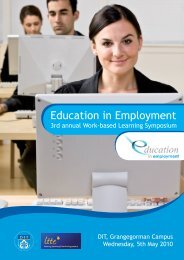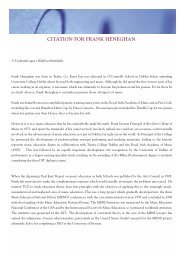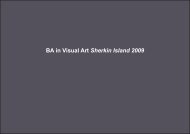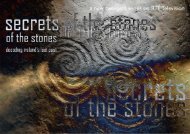TWICE THE SIZE - DIT Update - Dublin Institute of Technology
TWICE THE SIZE - DIT Update - Dublin Institute of Technology
TWICE THE SIZE - DIT Update - Dublin Institute of Technology
Create successful ePaper yourself
Turn your PDF publications into a flip-book with our unique Google optimized e-Paper software.
SCENARIO 2: WILD CATS OF EQUALITY<br />
“Harnessing the knowledge economy”<br />
This scenario is founded on a system <strong>of</strong> shared values, a fair<br />
distribution <strong>of</strong> opportunity and a desire for sustainable<br />
development. It is held that these are best attained through a<br />
strong framework <strong>of</strong> public policy under the aegis <strong>of</strong> a<br />
forceful European Union. There is the assumption <strong>of</strong> a<br />
worldwide metamorphosis with commercial and institutional<br />
renewal accelerating across the developed world, with policymaking<br />
and decision-taking having become increasingly<br />
delegated and expert. The emphasis throughout is on<br />
collective, collaborative and consensual action, shaped by<br />
commonly held attitudes and aspirations.<br />
Global<br />
It is a “transformed world” in 2030, where social and economic change gives rise to enlightened<br />
policies and voluntary actions that shape or supplement market forces. Civic society has the<br />
power to frame social and political agendas: there has been the ‘greening’ <strong>of</strong> a growing number<br />
<strong>of</strong> global corporations; and the imaginative use <strong>of</strong> new technologies has expanded<br />
communications networks and services worldwide.<br />
There is a trend towards a more peaceful, equitable and environmentally stable world. Greater<br />
access to information exists, power is more widely shared, new grass roots coalitions shaping<br />
the actions <strong>of</strong> governments and institutions have sprung-up, and the form <strong>of</strong> governance has<br />
generally been broadened. Communities make use <strong>of</strong> market forces with social and<br />
environmental goals, accepting economic competition but not losing sight <strong>of</strong> the need for<br />
making deliberate social choices and meeting basic human needs.<br />
This is a world <strong>of</strong> highly co-ordinated environmental and social initiatives in which the resources<br />
and persuasive powers <strong>of</strong> a number <strong>of</strong> groups are harnessed for specific actions on a global<br />
scale. Founded in 2025, the most influential institution is the Global Ecosystem Agency.<br />
Created to promote sustainable development, the GEA serves as the organisational centre for<br />
the development <strong>of</strong> worldwide policies and standards, and, with the WTO, acts as enforcer <strong>of</strong><br />
those policies. Over the past twenty years, indeed, governance itself has slowly been<br />
transformed through the widespread embedding <strong>of</strong> the sustainable development concept in<br />
business, civic and government institutions.<br />
During the first two decades <strong>of</strong> the 21 st century, Asian economic growth continued at a rapid<br />
pace. By contrast, growth in Europe and North America was relatively slow as a result <strong>of</strong> the<br />
demands <strong>of</strong> an ageing population and half-hearted attempts at social and economic<br />
110








